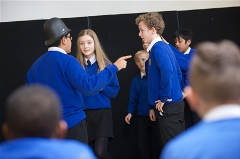“I like performing and enjoy working with different people in the group. When we show our work it is really exciting. I have begun to use more theatrical words when talking about the work we do and feel more confident about acting in front of my friends.” Year 7 student
We are particularly proud of the way we uphold our School's Intent in Drama by:
- Fostering highly productive relationships between students;
- Developing creative, self-regulating and resilient students;
- Encouraging students to reflect and to develop a strong moral compass.
These are shown through the range of activities we offer both in and out of lessons. Students work in groups to acquire knowledge and experience of drama styles and techniques. This promotes independence and resilience as students work as a team. Students learn about the context of theatre, developing their cultural capital. Furthermore, students reflect upon social constructs and ideas, developing their moral compass. There is a strong focus upon the use of precise, technical language in Drama lessons.
Key Stage 3
Our aims are the principles presented in the National Curriculum:
- Pupils will gain knowledge and understanding of drama and theatre.
- Pupils will gain skills in the artistic practice of drama through devising and script/text work.
- Pupils will learn to share and respond to drama and theatre performance thoughtfully.
- Pupils can adopt, create and sustain a range of roles, responding appropriately to others in role.
Pupils also have the opportunity to perform to a range of audiences and experience live theatre through extracurricular activities.
The curriculum is carefully structured, so that there are progressive levels of challenge and high expectations in each year.
From Year 7, students will undertake practical activities starting with a response to traditional stories, and considering a range of stimuli. Students will consider the significance of theatre in society and drama as a tool for communication. They will also be introduced to a range of subject specific terminology and encouraged to behave and speak like an expert.
By the end of Year 9, our learners will have an appreciation of the importance of theatre in society and an awareness of the social, cultural and political influence upon the creation of theatrical style. They will develop confidence in presenting themselves and their ideas, alongside other life skills. Students’ will have experienced theatre in different times and places as well as a number of published pieces. They will have developed their language for learning and creativity.
The Key Stage 3 & Key Stage 4 Drama Curriculum Plans can be found at the bottom of this page.
Examinations:
At GCSE we follow the Edexcel Specification.
The specification is made up of 3 components:
- Component 1: Devising - 40% of the qualification
- Component 2: Performance from text - 20% of the qualification
- Component 3: Theatre Makers in Practice (written exam paper) - 40% of the qualification
Enrichment Opportunities
- Theatre Visits
- Involvement in Drama Club & School Productions

